Apollo Oracle Set-up Guide
Overview
Apollo is an oracle for submitting prices on-chain. We plan to upgrade it and allow everyone to stream arbitrary third party data in the future. By taking part in Apollo and becoming an oracle operator, you will be securing the price of assets on-chain and help the network become more resilient in a decentralized manner. Participants receive tokens as rewards for their work, but it is important to note that the on-chain algorithm also allows for slashing based on bad behavior, which is defined as submitting prices out of a certain threshold range from a pivot price calculated on all submitted prices.
Apollo consists of four key components:
- The On-chain pallet that decides when a price is requested.
- An Off-Chain worker that monitors when a price has been requested and if so, submits a price for the request.
- An oracle node where the offchain worker is running.
- A Price-Feed (we provide a reference implementation for this component) that fetches the prices from a CEX/DEX and caches them, such that the Off-Chain worker is able to query those prices and stream them by submitting a transaction. You are open to use a price-feed of your choice.
The following diagram provides a high-level architecture of how these three components interact with each other.
High level architecture
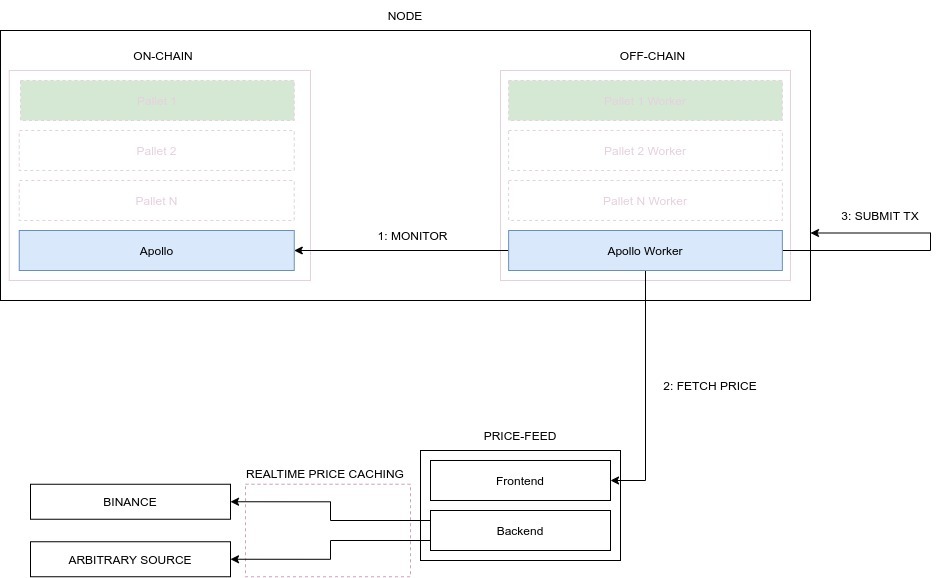
- Apollo off-chain worker monitors on-chain price requests.
- Once a price request for an asset has been detected, the off-chain worker does an http GET to the price-feed server and gets the latest price.
- If and only if the latest cached price (on the price-feed server) is recent enough (in seconds, configurable via the price-feed CLI), the off-chain worker submits a transaction containing the asset price.
Setting up a node
Setup a node by following the collator guide
Using PolkadotJS Web Interface
To see the block explorer of your collator and run extrinsics, the PolkadotJS web interface needs to be connected.
- Go to polkadot js →https://polkadot.js.org/apps/#/explorer
- Add custom endpoint
Connection should be established to the port 9988 of the IP address that is running your collator, for connecting to node running locally: ws://127.0.0.1:9988.
Make sure you have connected to the right port.
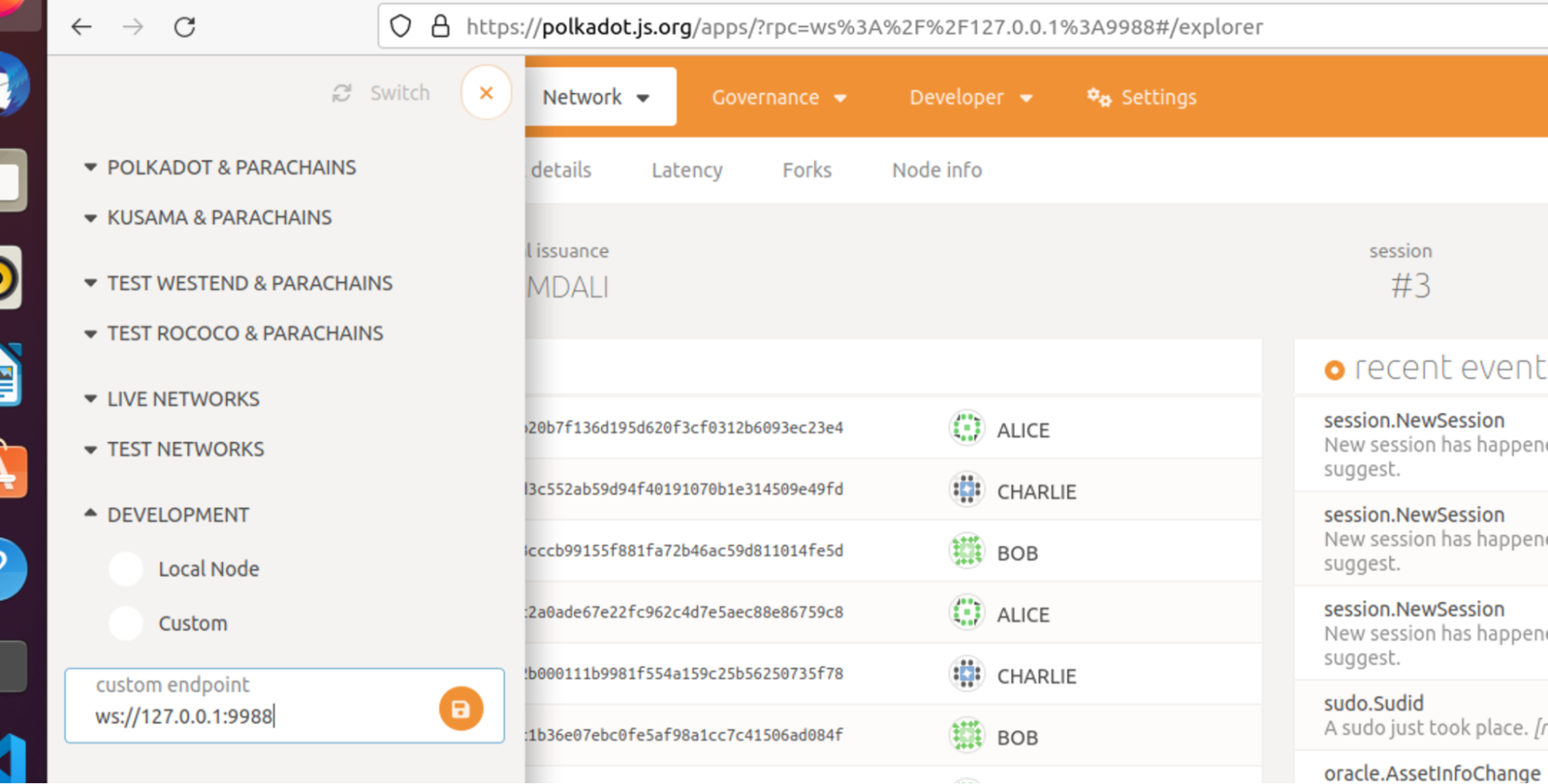
You should see the block explorer:
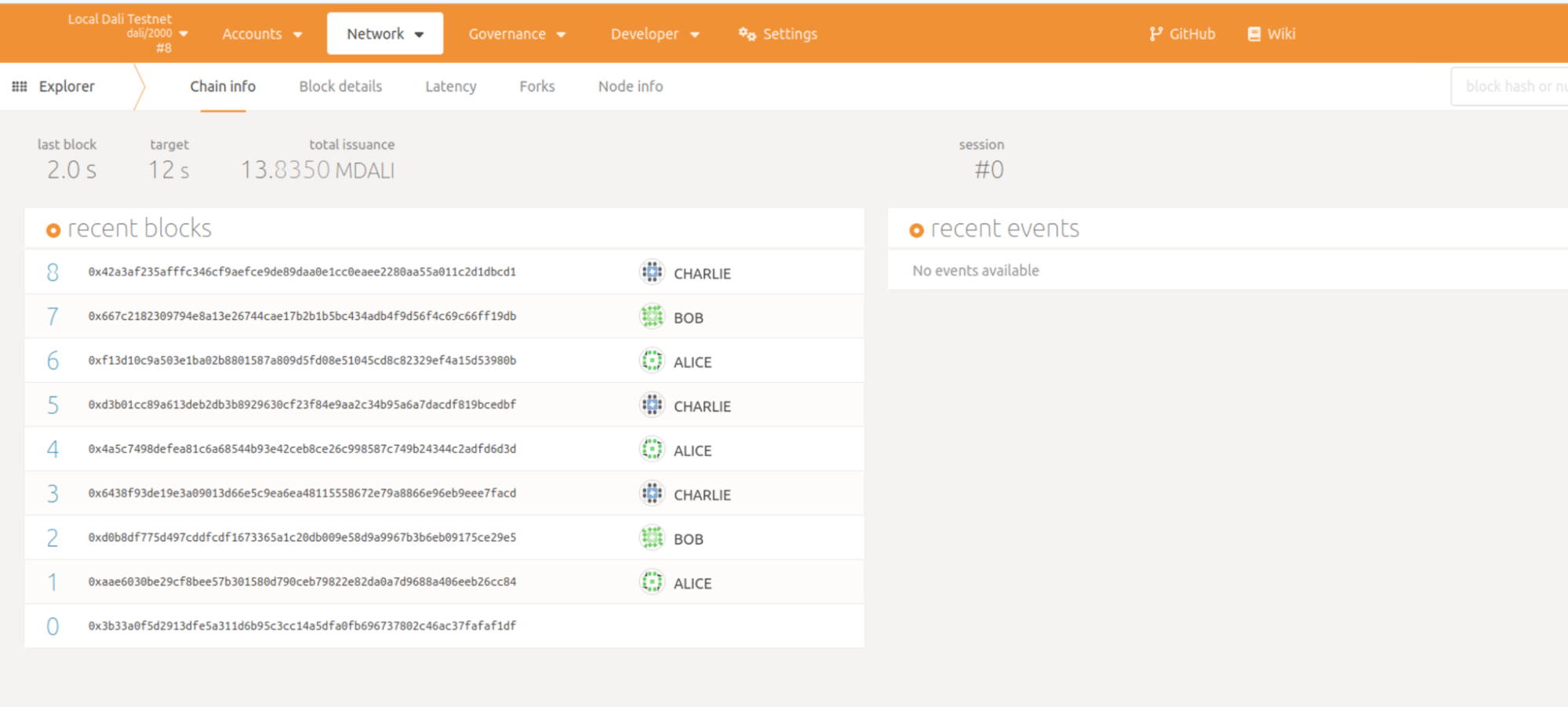
In this web UI we will run extrinsics & RPCs, to attach the price feed to the node.
Setting up the price feed (reference implementation)
Composable provides a reference implementation for the price-feed server. It can be found
at the following address, in the Composable GitHub repository. The implementation is general enough and allows any fork to implement a new feed easily. By default, the prices are fetched from the Binance public websocket API.
Setup
In this step, we will set up a rust compiler, a toolchain and build a node. \ \ Setup required libraries
Run the following command:
sudo apt update && sudo apt install -y git clang curl libssl-dev llvm libudev-dev pkg-config protobuf-compiler libprotobuf-dev
Get the project and build the price-feed
Run the following commands:
git clone --depth 1 --branch release-v9.10035.5 https://github.com/ComposableFi/composable.git composable-oracle-10035 && \
cd composable-oracle-10035/code && \
cargo build --release --package price-feed
Start Price-feed
You can try running the server with \
RUST_LOG=debug ./target/release/price-feed
The server will start indexing a list of predefined assets (hardcoded).
To make sure the price-feed is working correctly one should go to the browser.
By default, price-feed runs on localhost, port 3001.
Currently, the only assets supported for retrieving prices is KSM & DOT (corresponding to asset id's of 4 & 6 respectively), which can be accessed using the following link.
KSM: http://127.0.0.1:3001/price/4
DOT: http://127.0.0.1:3001/price/6
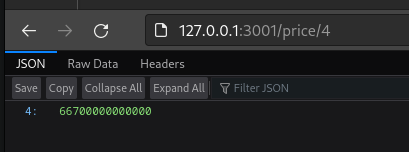
price-feed output should look like this.
[2022-06-09T19:08:25Z DEBUG price_feed::backend] notification received: Started { feed: Binance }
[2022-06-09T19:08:25Z INFO price_feed::backend] Binance started successfully
[2022-06-09T19:08:25Z DEBUG price_feed::backend] notification received: AssetOpened { feed: Binance, asset: KSM }
[2022-06-09T19:08:25Z INFO price_feed::backend] Binance has opened a channel for KSM
[2022-06-09T19:08:25Z DEBUG price_feed::feed::binance] connecting to binance
[2022-06-09T19:08:25Z DEBUG tungstenite::client] Trying to contact wss://stream.binance.com:9443/stream?streams=ksmusdt@aggTrade at 13.114.11.14:9443...
[2022-06-09T19:08:26Z DEBUG tungstenite::handshake::client] Client handshake done.
[2022-06-09T19:08:26Z DEBUG price_feed::feed::binance] running event loop
[2022-06-09T19:08:31Z DEBUG price_feed::backend] notification received: AssetPriceUpdated { feed: Binance, asset: KSM, price: TimeStamped { value: (Price(6659), Exponent(2)), timestamp: TimeStamp(1654801711) } }
[2022-06-09T19:08:36Z DEBUG price_feed::backend] notification received: AssetPriceUpdated { feed: Binance, asset: KSM, price: TimeStamped { value: (Price(6659), Exponent(2)), timestamp: TimeStamp(1654801716) } }
The default URL is:
localhost:3001/price/${ ASSET_ID }/
CLI Options
Run the following command:
./target/release/price-feed --help
For a list of CLI options.
ubuntu@oracle-test:~/price_feed/target/release$ ./price-feed --help
price-feed 1.0
Composable
USAGE:
price-feed [OPTIONS]
OPTIONS:
-c, --cache-duration <CACHE_DURATION>
Duration, in seconds, before a price is evicted from the cache [default: 10]
-e, --expected-exponent <EXPECTED_EXPONENT>
Price will be normalized to this exponent [default: 12]
-h, --help
Print help information
-l, --listening-address <LISTENING_ADDRESS>
Listening address for the frontend [default: 127.0.0.1:3001]
-p, --pythd-host <PYTHD_HOST>
Host address of the pythd server [default: http://127.0.0.1:8910]
-q, --quote-asset <QUOTE_ASSET>
Asset to be used as quote for pricing [default: USDT]
-V, --version
Print version information
Setting up Apollo (becoming an Oracle)
In order for a Collator to become an Apollo Oracle, you need to make sure that you deployed a price-feed server along your node.
Once you have node and price-feed setup and running, the following steps will be required to bind your price-feed to the node.
These are the wallet details for the Alice developer wallet.
It’s required for registering the offchain worker.
name: "Alice"
Address (public key): "5yNZjX24n2eg7W6EVamaTXNQbWCwchhThEaSWB7V3GRjtHeL"
Mnemonic(seed): "bottom drive obey lake curtain smoke basket hold race lonely fit walk//Alice"
The following steps are required to complete the setup of becoming an oracle:
- Register price feed URL
- Register offchain worker
- Set signer (for local testing)
- Create an oracle for the asset
Register price feed URL
Register your price-feed url in the local storage, kind must be PERSISTENT, the key is ocw-url, and the value
is http://localhost:3001/price/
JavaScript:
api.rpc.offchain.localStorageSet("PERSISTENT", stringToHex("ocw-url"), stringToHex("http://localhost:3001/price/"));
To do this go to:
Developer menu -> RPC calls -> offchain -> localStorageSet \

Register offchain worker
To do this go to:
Developer menu -> RPC calls -> author -> insertKey
And enter the details above, as seen in the screenshot and press: “Submit RPC call”.

Further Steps
Once these steps are complete, send us your collator node's public key, controller key, and signer key. You must have at least 200k PICA on your controller address and then we can onboard you as a oracle which results in 200k PICA staked. To submit prices for 2 or more assets, you will need to stake an additional 1k PICA for each asset you provide an oracle for on your controller address. To increase your stake, add more PICA to your controller addrress and call oracle.addStake extrinsic on PolkadotJS.
The distribution of rewards is based on the proportions of amount staked, therefore, the more PICA you stake, the more rewards you earn.
Setting up DevNet Oracle
For development mode, polkalaunch scripts should be used.
It sets up a local network with 4 collators with predefined keys and addresses.
Setup required prerequisites
A Debian based Linux system is required, we recommend Debian, Ubuntu or Linux Mint.
- Set up required packages
Run the following command:
sudo apt update && sudo apt install -y git clang curl libssl-dev llvm libudev-dev pkg-config wget
- Setup Rust binary and Toolchain
Run the following commands:
RUST_C="nightly-2021-11-07"
curl https://sh.rustup.rs -sSf | sh -s -- -y && \
export PATH="$PATH:$HOME/.cargo/bin" && \
rustup toolchain uninstall $(rustup toolchain list) && \
rustup toolchain install $RUST_C && \
rustup target add wasm32-unknown-unknown --toolchain $RUST_C && \
rustup default $RUST_C && \
rustup show
And wait for the installation process to finish.
- Setup Nodejs & Yarn
Run the following commands:
curl -o- https://raw.githubusercontent.com/nvm-sh/nvm/v0.35.3/install.sh | bash && \
export NVM_DIR="$HOME/.nvm" && \
[ -s "$NVM_DIR/nvm.sh" ] && \. "$NVM_DIR/nvm.sh" && \
nvm install v16.15.0 && \
nvm use v16.15.0 && \
npm install --global yarn
Run devnet
nix run .#devnet-picasso
This means your node has started.
Nodes are writing logs here:
ubuntu@oracle-test:~/composable/scripts/polkadot-launch$ ls
9988.log 9997.log alice.log charlie.log composable_and_basilisk.json ferdie.log node_modules rococo-local-raw.json yarn.lock
9996.log README.md bob.log composable.json dave.log
ubuntu@oracle-test:~/composable/scripts/polkadot-launch$ tail -f 9988.log
2022-05-23 10:23:24 [Parachain] PoV size { header: 0.1787109375kb, extrinsics: 2.4931640625kb, storage_proof: 5.80078125kb }
2022-05-23 10:23:24 [Parachain] Compressed PoV size: 7.423828125kb
2022-05-23 10:23:24 [Parachain] Produced proof-of-validity candidate. block_hash=0x67087d9d563ecbe2f13ab63d4280f003f80a4189be3f800c12adc82361463a2d
2022-05-23 10:23:25 [Relaychain] 💤 Idle (7 peers), best: #113 (0xb71b…7e30), finalized #110 (0x0ffc…245c), ⬇ 5.7kiB/s ⬆ 6.0kiB/s
2022-05-23 10:23:25 [Parachain] 💤 Idle (2 peers), best: #44 (0x88ff…32ad), finalized #42 (0xc49f…12c0), ⬇ 0.1kiB/s ⬆ 1.4kiB/s
2022-05-23 10:23:30 [Relaychain] ✨ Imported #114 (0x496f…c871)
2022-05-23 10:23:30 [Relaychain] ♻️ Reorg on #114,0x496f…c871 to #114,0x9970…5f18, common ancestor #113,0xb71b…7e30
2022-05-23 10:23:30 [Relaychain] ✨ Imported #114 (0x9970…5f18)
2022-05-23 10:23:30 [Relaychain] 💤 Idle (7 peers), best: #114 (0x9970…5f18), finalized #110 (0x0ffc…245c), ⬇ 4.5kiB/s ⬆ 4.0kiB/s
2022-05-23 10:23:30 [Parachain] 💤 Idle (2 peers), best: #44 (0x88ff…32ad), finalized #42 (0xc49f…12c0), ⬇ 24 B/s ⬆ 24 B/s
2022-05-23 10:23:34 [Relaychain] 👴 Applying authority set change scheduled at block #111
Setting signer (for local testing)
Bond the controller account by submitting a set_signer transaction (tie the Signer to the Controller). This transaction must be sent by the controller. The controller must have the necessary bond amount as it will be transferred to the signer and put on hold (reserved).
JavaScript:
api.tx.sudo.sudo(api.tx.oracle.setSigner(controller, signer))
Setting the signer automatically adds a small amount of funds to the oracle stake of this wallet. These are required for submitting prices.
Developer -> extrinsics -> Oracle -> setSinger

Create oracle for asset
We can create an oracle for an asset by using the extrinsic oracle.addAssetAndInfo(...) and calling it using administrative rights. To call this extrinsic as an administrator go to:
Developer -> Sudo -> Oracle -> addAssetAndInfo
Parameters:
- assetId: 4 (DOT), 6 (KSM)
- threshold: 3%
- minAnswers: 7
- maxAnswers: 12
- blockInterval: 6
- reward: 10000
- slash: 1000000000000000 (1,000 PICA)
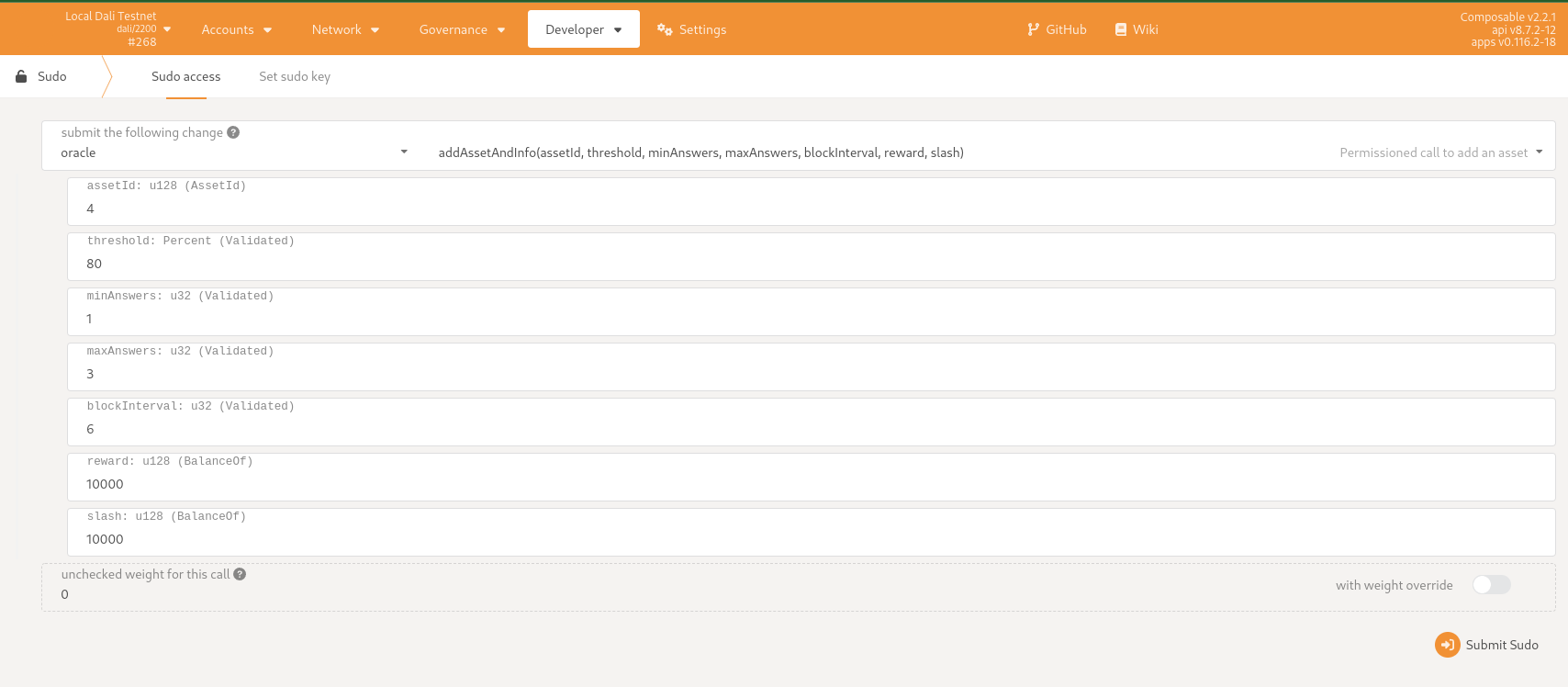
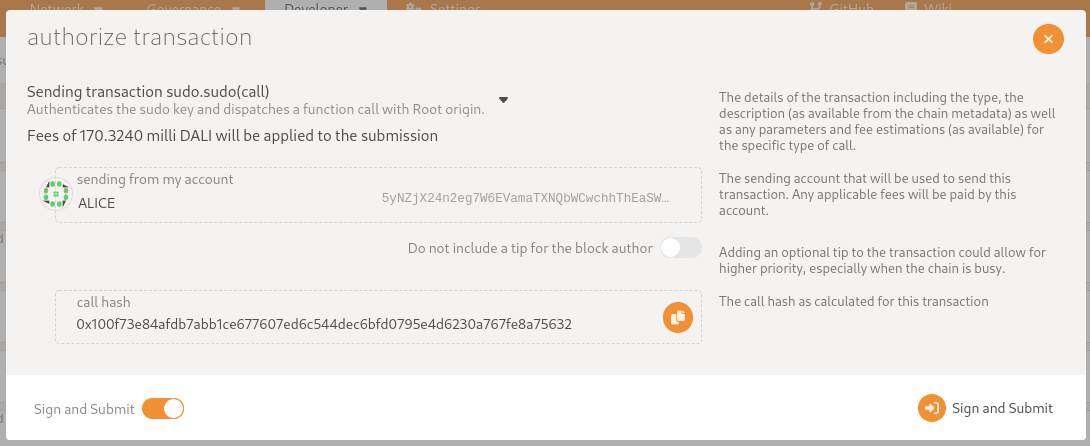
After successfully following these steps, you should see the blockchain successfully getting prices submitted, every few blocks.

External Link